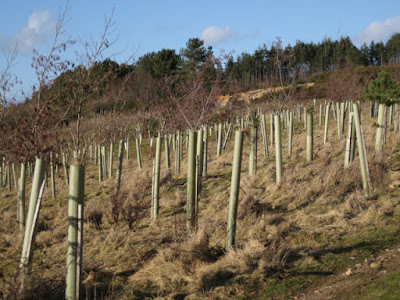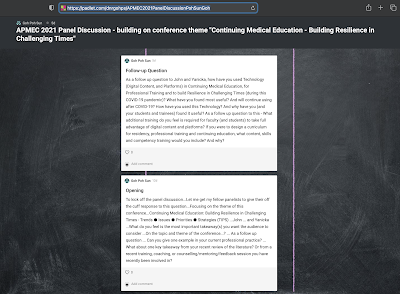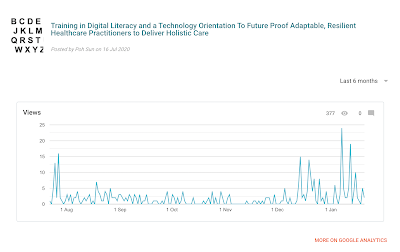above from
above from
Full transcript of my opening comments:
Hello.
Welcome to this Panel Discussion at APMEC 2021.
My name is Poh-Sun.
Let me also introduce my fellow panelist's, Yanika, and John.
The topic of this Panel Discussion - "Training in Digital Literacy and a Technology Orientation To Future Proof Adaptable, Resilient Healthcare Practitioners to Deliver Holistic Care" is closely related, and aligned to the theme of this year's APMEC conference - "Continuing Medical Education - Building Resilience in Challenging Times".
When planning this session, the ongoing COVID-19 pandemic was uppermost on my mind, as is our use of Technology, in order to continue to not only care for our patients, but also to continue to teach, and learn. Engage with content, and with each other.
As the COVID-19 pandemic unfolded, the importance and relevance of 'building resilience' in these 'challenging times' has become even more important. And we hope to address this panel discussion topic, and theme of the conference further over the next hour or so.
As a clinician-educator, with a longstanding special interest and focus on the use of technology in educational practice, and in faculty development; I asked myself what professional skill sets and competencies, as well as professional practice attributes best embodied the conference theme. Nurses, and Mental Health Professionals immediately came to mind. Which led me to invite Yanika and John to join me as fellow panelists for this session.
Each one of the panelists will give a short, around 5 minute presentation of key ideas, and then we will engage in an interactive Q and A after each short presentation, by first posing questions to each other, and then posing questions from the audience. Please type your questions in the 'Chat Box' on this Zoom platform, and we will try our best to categorise these questions as and when they come in, and engage with the questions within the allotted time (the panelists will pose your questions during the live online discussion for you, as the platform does not allow for individual live Q and A between participants and speakers). Do note that the session is recorded, and we will try our very best to engage with as many of your questions as possible, and after this panel discussion, work on a summary transcript of the key discussion points, which we will disseminate as a follow up document / short paper.
For my ultra-short 'presentation', I believe that Nature, exemplified in the metaphor of a sturdy tree, bending, but not breaking, in a storm, during strong winds, anchored by a strong foundation and deep network of roots, is a useful, memorable analogy of resilience, and adaptability, to a challenging, ever-changing environment. The idea of continuous growth, and adaptation by this tree as an intrinsic quality; that we can nurture and support this in the early stages with external supports, fertilising and nourishment can be transferred to our professional, educational and training practices. This is elaborated in a series of single 'slides' and short text reflections in the follow sections (marked alphabetically) on this panel discussion blog. Technology can support, augment, and amplify our efforts as teachers, and students.
One question that we will discuss further during our live Q and A is the idea of digital literacy, and planning a curriculum to build resilience.
I will now hand over to Yanika and John.
above from
above and below from
above from
above from
⬇️
⬇️
above photo taken from connecting walkway between KRW and NUHMC
on 12 January 2020 by Poh-Sun Goh
https://commons.wikimedia.org/wiki/File:Young_trees_above_former_sand_quarry_-_geograph.org.uk_-_1750657.jpg
above photo from
⬇️
🔄
🔄
above posted on session blog for APMEC 2021
at
Opening Comments for Panel Discussion
APMEC 2021
Theme: Continuing Medical Education - Building Resilience in Challenging Times
Poh-Sun Goh, 20 December 2020 @ 2.41am
"Internal and external factors apply (to building resilience in challenging times, including during this COVID-19 global pandemic). These can be considered at an individual, group, national, and global level. Situational awareness and individual knowledge, skills and crucially attitudes-feelings-emotional stability (which requires both individual perception and assessment, information, innate behavioural characteristics and abilities, training and coaching), and building up physical, mental and emotional fitness and reserves (physical, cognitive and emotional reserves - through adequate sleep, rest, "time off", nutrition, exercise, relaxation and unstructured time), combined with support mechanisms, external support (heart, mind and hands - family, friends, peer-work colleagues, well planned and aware HR practices and organised, supportive work and home environments, including providing manpower, resources, training and up to date, accurate, trusted information, and access to these). Technology provides tools, and platforms to assist, support, skill up, access information, global best practices, training, support reflection, assist (through Apps for example) sleep, relaxation practices, resources, networks to build resilience, and support practice; and to deploy this at scale both locally and globally."
🔄
⬆️
⬇️
Technology connecting our Hearts, Minds and Hands - Globally
A reflection on 2020, and COVID-19
Poh-Sun Goh, 19 December 2020 @ 0748am, Saturday, Singapore time
"Technology connects us, allows us to share stories, raise awareness, work together, assist and help one another, individually and collectively, bringing out the best in all of us, on a global basis. COVID-19 has brought the world together, our hearts, minds and hands, in a milestone transformative moment in human history. To share information, work together, support and help one another."
above from
see also
⬆️
⬇️
above from
above from
Yerkes, R.M. and Dodson, J.D. (1908), The relation of strength of stimulus to rapidity of habit‐formation. J. Comp. Neurol. Psychol., 18: 459-482. https://doi.org/10.1002/cne.920180503
⬆️
⬇️
⬆️
⬇️
" ... cannot pour from an empty cup. Self-care is important so that ... can give the best of themselves, not the remnants of what is left after fatigue." - Anthea Ong, The Straits Times, on 25 December 2020
⬇️
⬆️
⬇️
⬆️
⬇️
🔄
above and below screenshots from
⬆️
⬇️
🔄
Training in Digital Literacy and a Technology Orientation To Future Proof Adaptable, Resilient Healthcare Practitioners to Deliver Holistic Care
APMEC 2021 Virtual Conference Panel Discussion
Abstract
The COVID-19 pandemic has accelerated the integration of digitalisation and technology in healthcare practice, and throughout the continuum of education and training, from undergraduate, through postgraduate to continuing education and professional development. Training in digital literacy and a technology orientation is one key element to enable a future proof, healthcare practitioner. The aim of this panel discussion will be to explore how we can plan a curriculum to do this, and what experiences and competencies we can focus on to produce an adaptable, resilient healthcare practitioner, capable of delivering holistic care. A review of current and near future technology and pedagogy will be made, as well as a critical examination of challenges and pitfalls when using and relying on technology.
⬇️
Takeaways and Key points for practice (posted 24 January 2021 @ 0225am)
above and below from Poh-Sun
➡️Transfer to Practice point: Role of Teacher, Educator and Instructor in curating relevant, useful, high quality online resources; raising Awareness of these, making these Accessible, using Apps (metaphor for Technology) - https://www.slideshare.net/dnrgohps/apmec-2021-panel-discussion-awareness-access-apps
🔄
above from Yanika
🔄
above from John
⬆️
⬇️
🔄
⬆️
⬇️
above from
above from















































No comments:
Post a Comment
Note: only a member of this blog may post a comment.